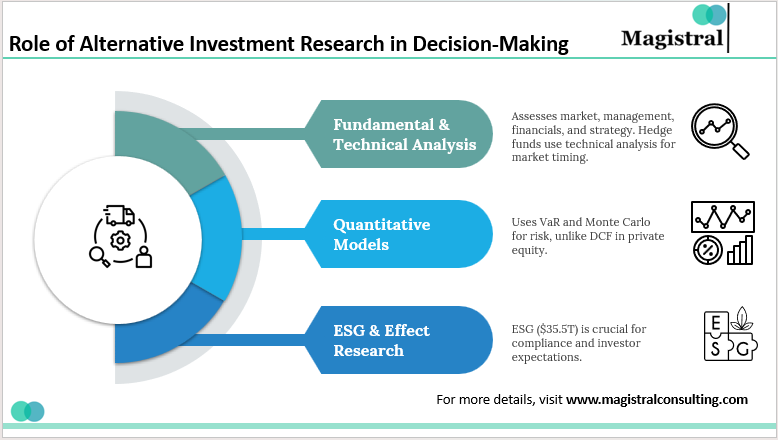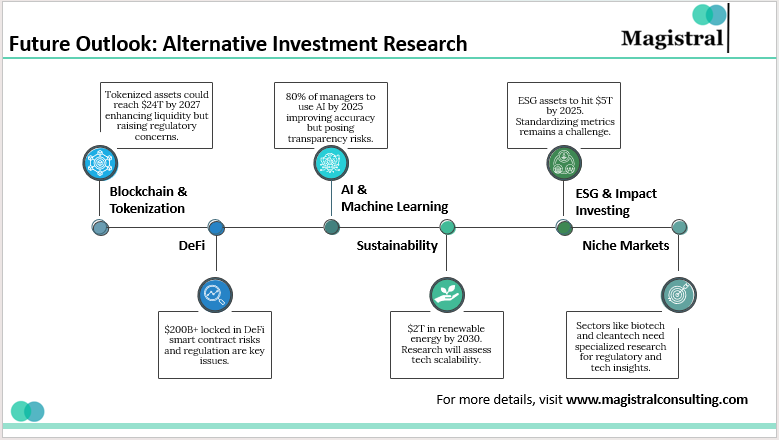The Rise of Alternative Investments
Alternative assets include hedge funds, private equity, and venture capital, as well as real assets and commodities. It has witnessed great popularity since institutional and sophisticated investors are looking for higher yields and diversification also protection from inflation. In other words, as normal asset classes like stocks and bonds become more unstable, alternative investments (AIs) provide different risk-return spectra which need sound and lucid research techniques to ascertain them.
As stated by Preqin, within 5 years, the global assets under management (AUM) of alternatives have increased from $8.4 trillion to over $13 trillion in 2022 and is expected to be about $23 trillion by 2027. The trend in this growth trajectory, calls for the use of advanced alternative investment research techniques to strategize on how to invest in these assets due to changes in regulations, pliable markets, and the investors’ outlook towards these assets.
The Role of Research in Alternative Investment Decision-Making
Conducting alternative investment research is significantly more challenging than it is in traditional resources. The scope of research entails the following:

Role of Alternative Investment Research in Decision-Making
Fundamental and Technical Analysis
For alternative investment research, primary company assessment, particularly in private equity or venture capital, requires extensive skills in assessing the market size, analyzing the quality of management, the financials of the firm as well as the business strategy of the firm. Technical analysis is applied by hedge fund managers to strategize when entry and exit points should be in volatile markets.
Quantitative Models
Risk modeling is vital in alternative investment research because of its complex nature and risk factors that are outside the box. Unlike private equity veterans who endorse DCF and IRR approaches for median term outlooks. Hedge funds typically apply VaR and Monte Carlo techniques to quantify possible losses.
ESG and Effect Research
The Environment, Social and Governance (ESG) considerations have been made a critical aspect in the investment appraisal process for institutional investors. Managing outlaying $35.5 trillion towards ESG ranges, alternative investment funds now have to factor ESG elements into the alternative investment research process to meet compliance and investor requirements.
Geographic and Sector Specialization
Alternative investment research has a high sector and geography focus. The growth of the so-called BRIC countries, which are at an emerging market stage, Asian countries Pacific, African and Latin American regions have stimulated the need for localized market-oriented and country-specific skills. Sector-wise focus, information technology, medical care and green energy sectors are key attractive areas for private equity and venture capital studies due to their aggressive expansion all over the world and the shift of the economy to a green one.
Risk Management and Compliance Research
In the wake of the tightening regulations, notably after the 2008 economic recession, the need for compliance and risk management research has grown tremendously. Fund managers in Europe, for example, under the European Alternative Investment Fund Managers Directive (AIFMD), and in the US under the Dodd-Frank Act have to adhere to strict guidelines on reporting, transparency and risk management. Consequently, these are teams that have to work within the confines of regulatory regimes while at the same time ensuring that the investment theses are still standing.
Future Outlook: Next Frontier in Alternative Investment Research
There is expected growth within the agenda of alternative investment research for the next few decades focusing particularly on investment strategies that integrate sustainability with a big focus on private equity and real assets.

Future Outlook: Alternative Investment Research
Blockchain and Tokenization of Assets
The advancement of blockchain technology and its potential for the tokenization of assets will revolutionize the structure of alternative investments in terms of enhancing liquidity, transparency and accessibility to tackle this problem, it will be necessary to tokenize the previously exchangeable illiquid assets, thus enabling fractional ownership and enhancing investment prospects. However, research or alternative investment research language develops a tendency to retreat into ambiguous generalizations when it comes to the testing of blockchain for such spheres as smart contract utilization and regulatory compliance. The total worth of tokenized assets is expected to grow and reach $24 trillion by 2027; therefore, such processes may lead to increased scrutiny on the issues of regulatory compliance and liquidity management.
AI and Machine Learning in Research
The use of artificial intelligence and machine learning systems is becoming more and more relevant to alternative investment research. Given that 52% of alternative asset managers already apply AI. This is likely to reach 80% in 2025, the growing popularity of AI in investment research will verily be without prediction errors and risk modeling for very large data ranges. Yet, there is a need for disclosure because “black box” models can lead to unhealthy decision-making. It will be necessary for alternative investment research to provide evidence justifying the use of such AI solutions and the danger accompanying model overfitting in practice.
ESG and Impact Investing
ESG, in alternative investment research, with an estimation of global assets worth $5 trillion inclusive by the year 2025. Researchers must elevate the study of this area beyond traditional monetary metrics used to assess Ashland and its peers, incorporating environmental and social dimensions. The lack of a common ESG measurement standard creates challenges, forcing researchers to develop their own yardsticks for evaluating ESG applications across industries in alternative investment research. In the future, carbon reduction policies will also shape how companies implement ESG practices.
Decentralized Finance (DeFi)
The finance of services like never before with DeFi’s total value locked to in excess of $200 billion as of 2023. DeFi systems facilitate lending, borrowing, and derivatives trading through blockchain technology. Stakeholders must pay close attention to the risks these systems introduce, such as smart contract vulnerabilities and the potential for regulatory arbitrage. Monitoring technological adoption and appreciation by potential users in conjunction with appropriate regulation will be a must.
Sustainability-Focused Private Equity and Infrastructure Investments
Sustainability contributes to current private equity investment in areas such as renewable energy. Where more than $2 trillion is expected to be invested by the year 2030. The researchers in alternative investment research will have to analyze the sustainable technology in question and project whether its level of sustainable technology could be able to achieve large-scale application in the future. Advanced scenario analysis will prove significant in determining and shaping investment in green infrastructure by predicting possible outcomes of favorable or punitive regulatory incentives.
Customization of Research for Niche Markets
Alternative investments are becoming diverse. Hence there is a need for alternative investment research in focus segments like biotechnology, space, clean technology, etc. This necessitates expertise in the respective industry apart from financial engineering. In this regard, investment in narrower scopes will call for alternative investment research to identify regulatory, technological and knowledge systems relevant to the sectors which will enable them to better advise on unique targeted investment strategies.
Magistral’s Services for Alternative Investment Research
At Magistral Consulting, we provide comprehensive Alternative Investment Research services to support investment firms in making well-informed decisions across private equity, venture capital, hedge funds, and other alternative assets. We offer the following key services:
Industry Research
Magistral offers in-depth Industry Research that helps alternative investment firms identify and capitalize on attractive sectors. By examining macroeconomic factors, market trends, and sector-specific dynamics, we provide investors with a detailed understanding of the industry’s most ripe for investment.
Company Profiling and Competitive Landscaping
We also offer Company Profiling and Competitive Landscaping, which involves thorough analysis of potential investment targets. This includes assessing a company’s financial health, management quality, market strategy, and growth potential. Our competitive landscaping goes further by analyzing competitors and industry players, offering investors a comprehensive view of a company’s competitive positioning.
Preparing Investment Memos
Magistral assists in Preparing Investment Memos that provide a clear and comprehensive case for investment. Our memos combine financial analysis, risk assessments, and growth forecasts, enabling decision-makers to evaluate investment opportunities effectively.
Researching Incoming Pipeline
Our Researching Incoming Pipeline service ensures that investment firms maintain a steady flow of potential deals. We continuously monitor and evaluate a broad range of investment targets to provide a curated pipeline of opportunities. Whether it’s private equity, venture capital, or distressed assets, Magistral ensures that firms have access to the best opportunities.
About Magistral Consulting
Magistral Consulting has helped multiple funds and companies in outsourcing operations activities. It has service offerings for Private Equity, Venture Capital, Family Offices, Investment Banks, Asset Managers, Hedge Funds, Financial Consultants, Real Estate, REITs, RE funds, Corporates, and Portfolio companies. Its functional expertise is around Deal origination, Deal Execution, Due Diligence, Financial Modelling, Portfolio Management, and Equity Research
For setting up an appointment with a Magistral representative visit www.magistralconsulting.com/contact
About the Author
The article is authored by the Marketing Department of Magistral Consulting. For any business inquiries, you can reach out to prabhash.choudhary@magistralconsulting.com
Why is Alternative Investment Research important?
Alternative investments offer diversified risk-return profiles compared to traditional asset classes. Proper research is crucial for evaluating potential returns, managing risks, and ensuring compliance with evolving regulatory frameworks. As alternatives grow in popularity, especially among institutional investors, accurate research becomes indispensable for capital allocation and risk mitigation.
How does technology impact Alternative Investment Research?
Technologies like Artificial Intelligence (AI), machine learning, and big data analytics are transforming alternative investment research. For example, AI can process vast datasets from sources like social media and satellite imagery, offering predictive insights. This helps investors in identifying trends, optimizing strategies, and improving decision-making in real-time.
What role does ESG play in Alternative Investment Research?
ESG (Environmental, Social, and Governance) factors have become a critical component of alternative investment research. Many institutional investors now require ESG considerations in investment decisions. Research in this area focuses on how companies meet ESG criteria and the potential impact on financial performance, especially in the long term.
How does geographic and sector specialization influence Alternative Investment Research?
Different geographies and sectors present unique opportunities and risks. Research tailored to specific regions or sectors is essential in alternative investments. For example, emerging markets in Asia, Africa, and Latin America often require localized research, while sectors like healthcare, technology, and renewable energy have distinct dynamics that need specialized analysis.